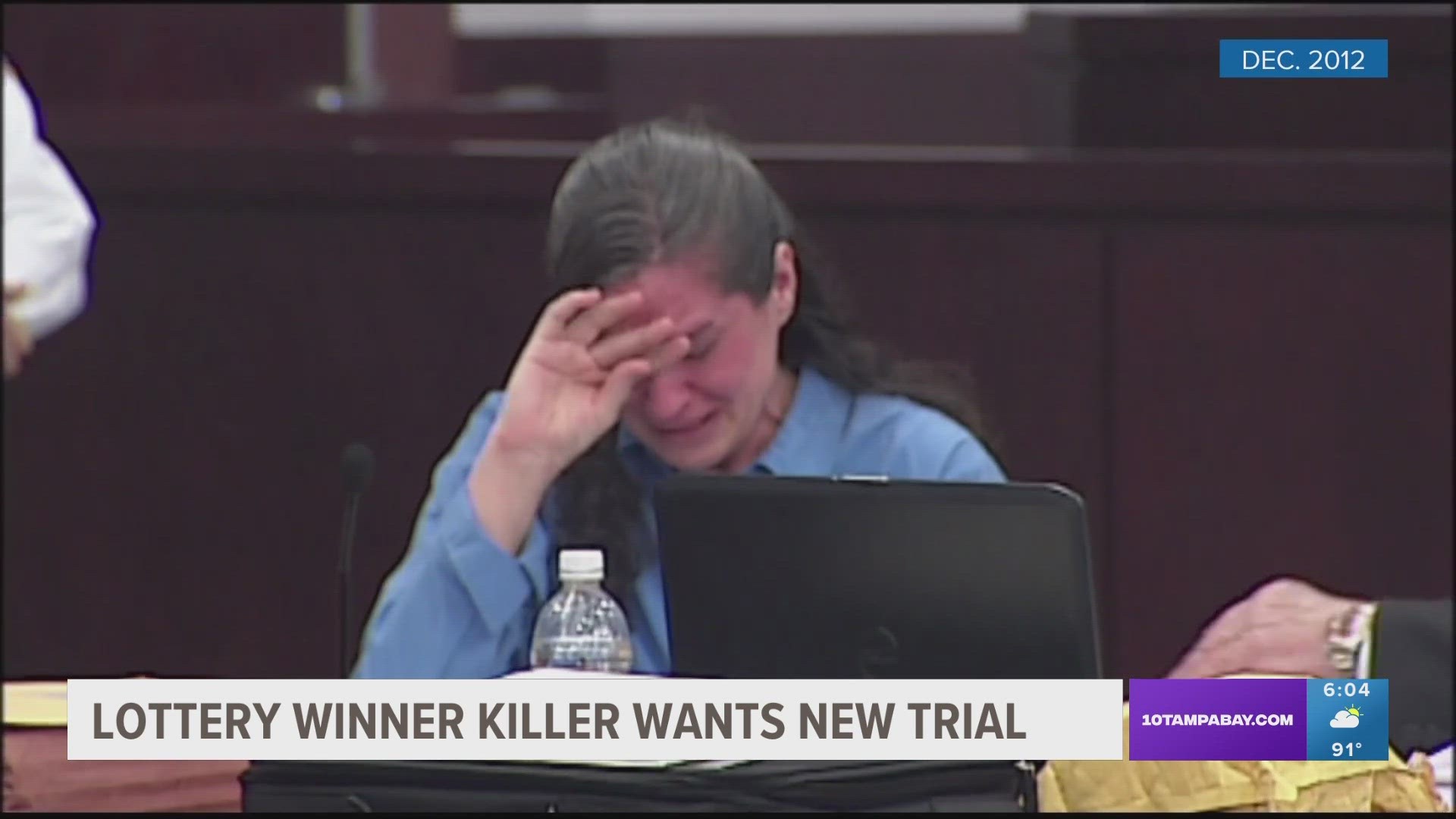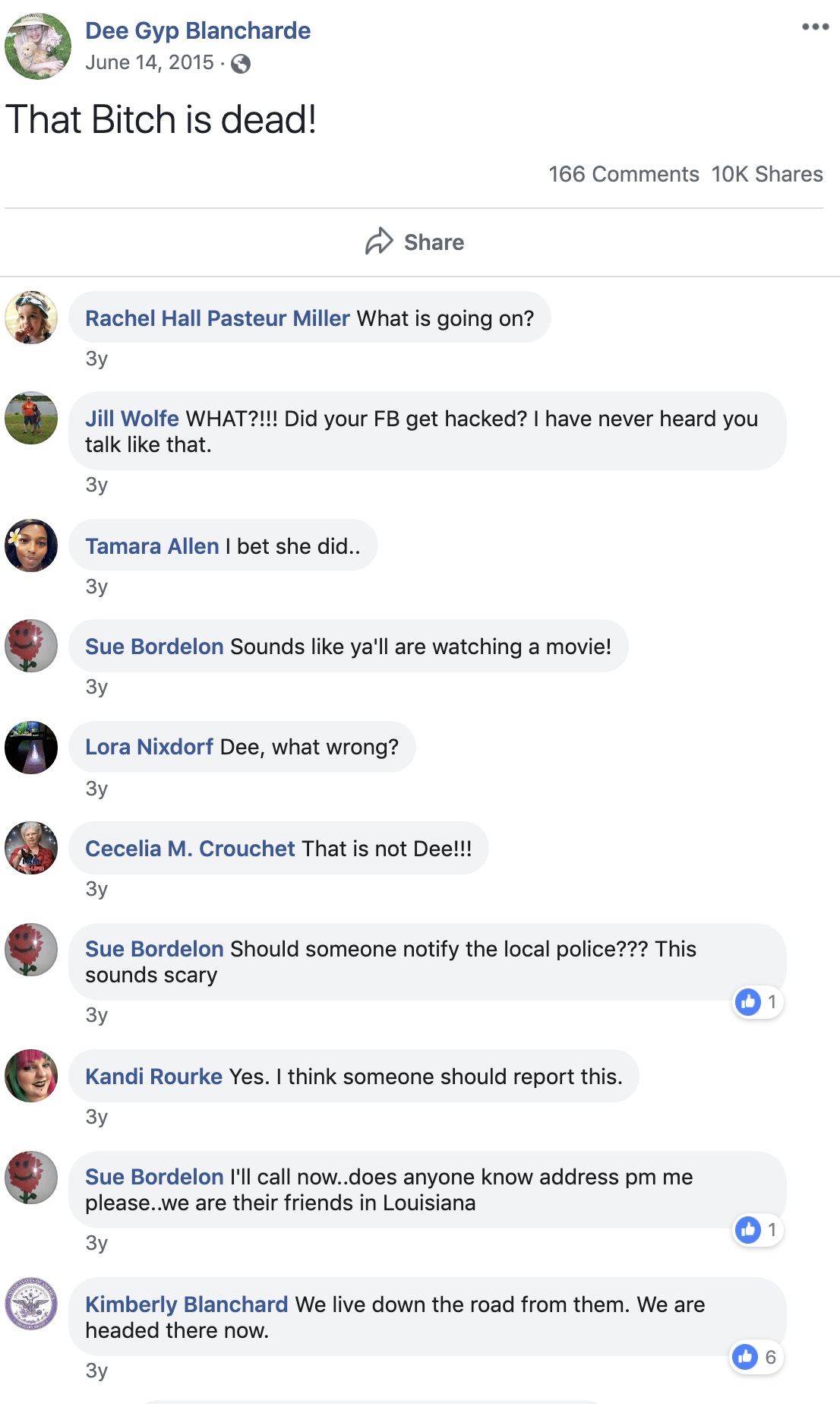The case of Dee Dee murder photos has captured the attention of millions worldwide, sparking debates and raising questions about the dark underbelly of internet culture and human curiosity. The tragic story of Dee Dee Blanchard and her mother, Gypsy Rose Blanchard, continues to haunt society, even years after the shocking events unfolded. The case is not only a reflection of a deeply disturbed family dynamic but also an example of how mental health and abuse can lead to devastating consequences.
Understanding the context behind the Dee Dee murder photos requires delving into the complexities of the relationship between Dee Dee and her daughter, Gypsy Rose. This case has been widely discussed in true crime circles, documentaries, and media outlets, shedding light on the psychological and emotional struggles faced by the individuals involved. As we explore this story, it becomes evident that the tragedy extends far beyond the crime itself.
This article aims to provide a comprehensive overview of the Dee Dee murder photos, examining the events leading up to the crime, the psychological factors at play, and the societal implications of such cases. By exploring the truth behind the headlines, we hope to foster a deeper understanding of the issues surrounding this case.
Read also:Understanding Hdhud 4uin A Comprehensive Guide To Its Features Benefits And Applications
Table of Contents
- Biography of Dee Dee Blanchard
- Timeline of Events
- Mental Health and Abuse
- Media Coverage and Public Reaction
- The Controversy Surrounding Murder Photos
- Legal Proceedings and Outcomes
- Psychological Analysis of the Parties Involved
- Societal Impact and Lessons Learned
- Ethical Considerations in True Crime
- Conclusion
Biography of Dee Dee Blanchard
Early Life and Background
Dee Dee Blanchard was born on July 21, 1970, in Springfield, Missouri. She grew up in a modest family and later became a single mother to her daughter, Gypsy Rose Blanchard. Over the years, Dee Dee became increasingly controlling, convincing the world that her daughter suffered from multiple severe illnesses, including muscular dystrophy and leukemia. This led to a life of isolation for Gypsy Rose, who was confined to a wheelchair and homeschooled.
Biographical Details
| Full Name | Dee Dee Blanchard |
|---|---|
| Date of Birth | July 21, 1970 |
| Place of Birth | Springfield, Missouri |
| Children | Gypsy Rose Blanchard |
| Date of Death | June 9, 2015 |
Dee Dee's life took a tragic turn when she was allegedly murdered by her daughter, Gypsy Rose, and her boyfriend, Nicholas Godejohn. The crime shocked the nation and brought to light the disturbing dynamics within the Blanchard household.
Timeline of Events
Leading Up to the Murder
The events leading up to Dee Dee's murder were marked by years of manipulation and abuse. Dee Dee fabricated Gypsy Rose's illnesses, controlling every aspect of her life. This Munchausen by Proxy syndrome led to a toxic environment where Gypsy Rose felt trapped and desperate for freedom.
- 2013: Gypsy Rose begins secretly communicating with Nicholas Godejohn online.
- 2014: Gypsy Rose reveals her mother's deception to Nicholas, planning their escape.
- June 9, 2015: Dee Dee is stabbed to death in her home by Nicholas Godejohn, with Gypsy Rose's involvement.
The timeline highlights the gradual escalation of tension and the eventual act of violence that ended Dee Dee's life.
Mental Health and Abuse
Understanding Munchausen by Proxy
Munchausen by Proxy is a psychological disorder where a caregiver fabricates or induces illness in someone under their care. In the case of Dee Dee Blanchard, her manipulation of Gypsy Rose's health was a textbook example of this condition. Dee Dee's actions were driven by a need for attention and control, leading to severe consequences for her daughter.
Experts estimate that cases of Munchausen by Proxy are rare but often result in significant harm to the victims. According to a study published in the Journal of the American Academy of Child & Adolescent Psychiatry, the psychological impact on victims can last a lifetime, affecting their trust, autonomy, and overall well-being.
Read also:Telegram 2025 Wasmo Exploring The Future Of Messaging And Community Building
Media Coverage and Public Reaction
The Role of the Media
The Dee Dee murder photos and the subsequent media coverage brought widespread attention to the case. Documentaries like "Killer Kids" on Investigation Discovery and the Netflix series "The Act" further popularized the story, sparking public interest and debate. While the media played a crucial role in raising awareness, it also raised ethical questions about the exploitation of true crime for entertainment purposes.
A survey conducted by the Pew Research Center found that 70% of Americans consume true crime content, highlighting the growing fascination with such stories. However, this fascination often blurs the line between education and sensationalism.
The Controversy Surrounding Murder Photos
Why Murder Photos Matter
The release of Dee Dee murder photos reignited discussions about the ethics of sharing such images. While some argue that these photos provide valuable evidence for investigations, others believe they exploit the victims and their families. The debate centers on balancing the need for transparency with the respect for privacy and dignity.
According to the International Association of Chiefs of Police, the use of crime scene photos should be guided by strict protocols to ensure they are used responsibly. In the case of Dee Dee Blanchard, the circulation of her murder photos highlighted the complexities of this issue.
Legal Proceedings and Outcomes
The Trial of Gypsy Rose Blanchard and Nicholas Godejohn
Gypsy Rose Blanchard and Nicholas Godejohn were both charged with first-degree murder in the death of Dee Dee Blanchard. The trial shed light on the manipulative relationship between Dee Dee and her daughter, as well as the role of Nicholas in the crime.
In 2016, Gypsy Rose pleaded guilty to second-degree murder and was sentenced to 10 years in prison. Nicholas Godejohn was convicted of first-degree murder and sentenced to life in prison without parole. The legal proceedings underscored the complexities of assigning blame in cases involving psychological manipulation and abuse.
Psychological Analysis of the Parties Involved
Gypsy Rose Blanchard
Gypsy Rose's psychological profile reveals a young woman who was deeply affected by her mother's manipulation. Growing up in isolation and being forced to play the role of a chronically ill child took a toll on her mental health. Psychologists suggest that her involvement in the murder was driven by a desire to reclaim her autonomy and escape her mother's control.
Nicholas Godejohn
Nicholas Godejohn's role in the crime was influenced by his relationship with Gypsy Rose and his own troubled past. His actions were motivated by a need to protect Gypsy Rose and help her escape her abusive situation. However, his violent methods ultimately led to tragic consequences.
Societal Impact and Lessons Learned
Preventing Future Tragedies
The Dee Dee Blanchard case serves as a stark reminder of the importance of addressing mental health and abuse in our society. It highlights the need for early intervention and support systems for families affected by such issues. By understanding the dynamics at play in this case, we can work towards preventing similar tragedies in the future.
Organizations like the National Domestic Violence Hotline and the National Alliance on Mental Illness provide resources and support for individuals and families in crisis. Raising awareness and breaking the stigma surrounding mental health and abuse is crucial in creating a safer and more compassionate society.
Ethical Considerations in True Crime
The Responsibility of Content Creators
The rise of true crime content has brought attention to important issues but also raises ethical concerns. Content creators must balance the need for storytelling with the responsibility to respect the victims and their families. The circulation of Dee Dee murder photos and other sensitive materials should be approached with caution and sensitivity.
Guidelines from organizations like the Society of Professional Journalists emphasize the importance of ethical reporting in true crime cases. By adhering to these principles, content creators can ensure that their work contributes positively to society rather than exploiting its darkest moments.
Conclusion
The case of Dee Dee murder photos is a haunting reminder of the complexities of human relationships and the consequences of unchecked abuse. By examining the events leading up to the crime, the psychological factors at play, and the societal implications, we gain a deeper understanding of this tragic story.
We encourage readers to reflect on the lessons learned from this case and consider how they can contribute to a more supportive and compassionate society. Share your thoughts in the comments below, and explore other articles on our website for further insights into true crime and its impact on our world.


